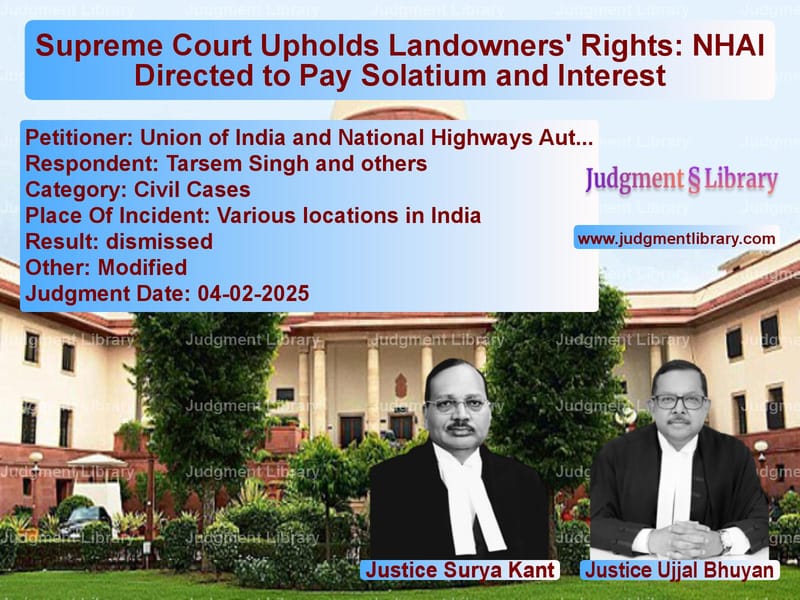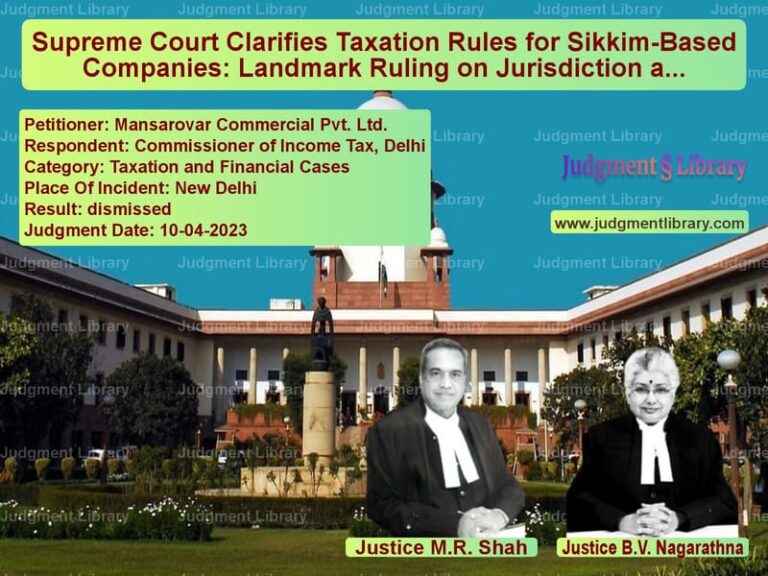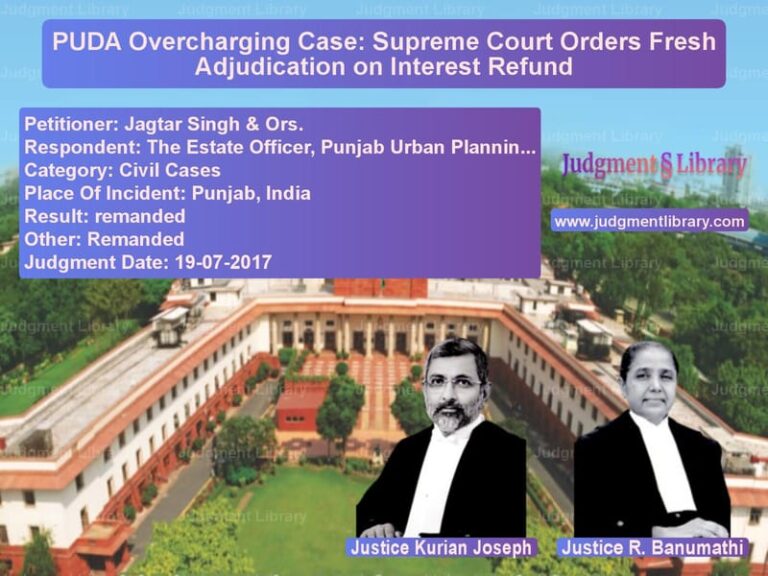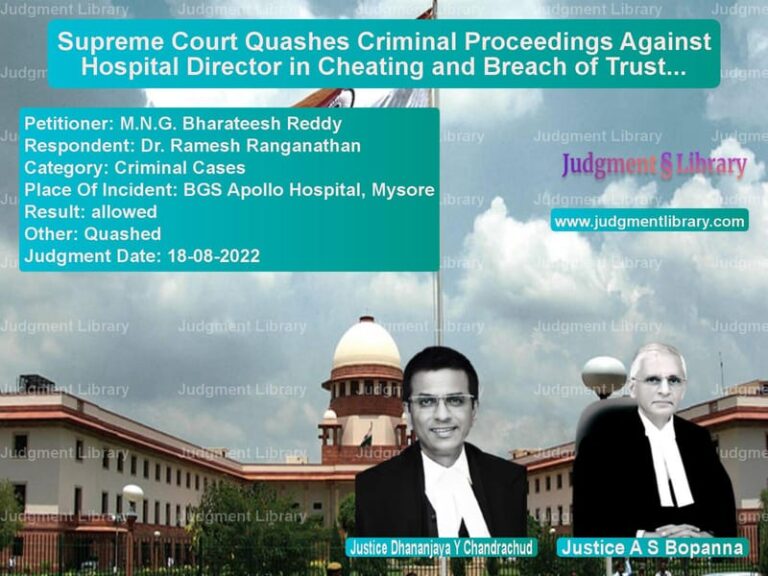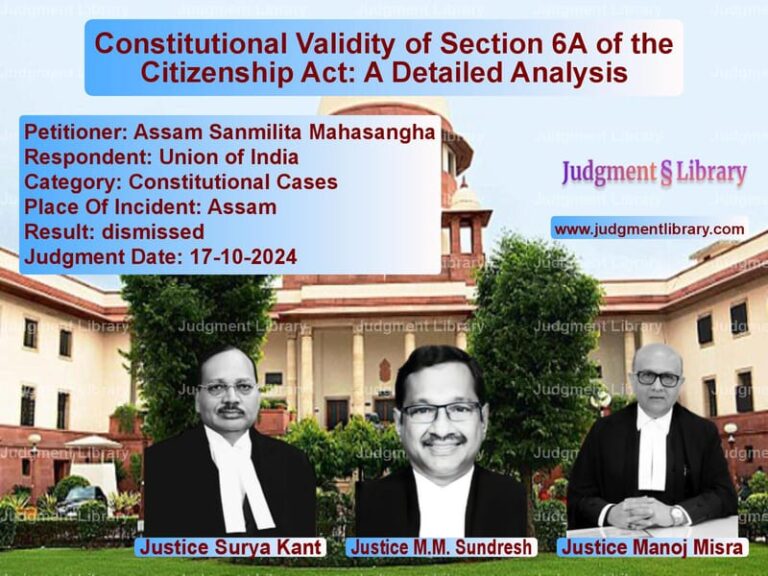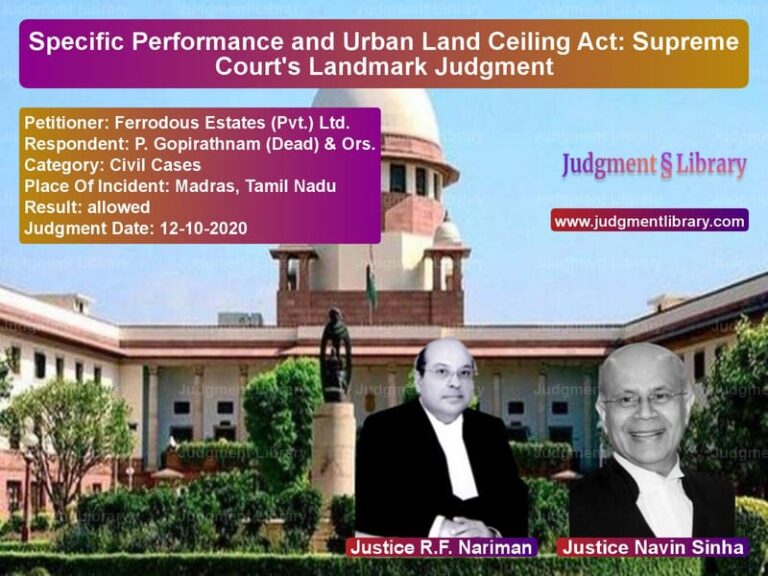Supreme Court Upholds Landowners’ Rights: NHAI Directed to Pay Solatium and Interest
The Supreme Court of India, in a landmark judgment, has upheld the rights of landowners affected by land acquisitions under the National Highways Act, 1956 (NHAI Act). The case involved the National Highways Authority of India (NHAI) seeking clarification on the applicability of solatium and interest in land acquisitions conducted between 1997 and 2015. The Court dismissed the NHAI’s plea for prospective application of its earlier ruling in Union of India v. Tarsem Singh, ensuring that landowners are entitled to compensation benefits even for past acquisitions.
Background of the Case
The issue arose when NHAI filed a Miscellaneous Application requesting clarification on the Supreme Court’s 2019 ruling in Tarsem Singh, which held that landowners whose land was acquired under the NHAI Act were entitled to solatium and interest. The government had argued that this judgment should apply only prospectively and not reopen past cases.
Various High Courts, following the Tarsem Singh ruling, had awarded compensation benefits to landowners, prompting NHAI to appeal these decisions before the Supreme Court.
Key Legal Issues
- Whether the Supreme Court’s decision in Tarsem Singh applies retrospectively to land acquisitions conducted between 1997 and 2015.
- Whether landowners affected by past acquisitions are entitled to solatium and interest.
- The financial implications for NHAI and the public exchequer.
Arguments by NHAI
The NHAI, represented by the Solicitor General, argued:
- The Tarsem Singh judgment should apply only prospectively to avoid reopening past acquisitions and causing financial strain.
- Retrospective application would impose an additional burden of Rs. 92.18 crores on the government.
- Reopening concluded cases would disrupt settled legal positions and lead to mass litigation.
“If the judgment in Tarsem Singh is applied retrospectively, it would necessitate reopening all acquisitions made by NHAI between 1997 and 2015, placing an enormous burden on the public exchequer.”
Arguments by Landowners
On the other hand, landowners, represented by senior counsel, contended:
- The denial of solatium and interest to landowners whose land was acquired between 1997 and 2015 created unjust discrimination.
- The 2013 Act recognized solatium and interest as fundamental compensation rights, and denying them retrospectively was unconstitutional.
- The government had already conceded in earlier cases that these benefits should be paid, making its current position contradictory.
“Rendering the Tarsem Singh judgment prospective would result in hostile discrimination against landowners who had their lands acquired before 2015.”
Supreme Court’s Observations
The Supreme Court, after a detailed analysis, rejected NHAI’s plea and held:
- Applying the ruling only prospectively would unfairly exclude a large group of landowners who had been denied rightful compensation.
- The financial burden argument was not a valid justification for denying compensation benefits.
- The doctrine of immutability, which prevents reopening settled cases, did not apply since the issue concerned statutory compensation under expropriation laws.
“When a provision is declared unconstitutional, continued disparity strikes at the core of Article 14 and must be rectified, particularly when such disparity affects only a select group.”
Final Judgment
The Supreme Court ruled:
“The judgment in Tarsem Singh applies retrospectively. NHAI is directed to ensure that landowners whose lands were acquired between 1997 and 2015 are awarded solatium and interest as per the ruling.”
The Court also directed the Competent Authority to calculate and disburse the compensation amounts without further delay.
Significance of the Judgment
This ruling reinforces the principle that land acquisition must be fair and just for all affected landowners. It prevents the government from selectively applying legal benefits and ensures that compensation rights are not arbitrarily denied.
For landowners, this judgment sets a precedent that strengthens their claims in similar disputes. For policymakers, it serves as a reminder that retrospective injustices in compensation laws must be rectified.
Petitioner Name: Union of India and National Highways Authority of India.Respondent Name: Tarsem Singh and others.Judgment By: Justice Surya Kant, Justice Ujjal Bhuyan.Place Of Incident: Various locations in India.Judgment Date: 04-02-2025.
Don’t miss out on the full details! Download the complete judgment in PDF format below and gain valuable insights instantly!
Download Judgment: union-of-india-and-n-vs-tarsem-singh-and-oth-supreme-court-of-india-judgment-dated-04-02-2025.pdf
Directly Download Judgment: Directly download this Judgment
See all petitions in Property Disputes
See all petitions in Damages and Compensation
See all petitions in Judgment by Surya Kant
See all petitions in Judgment by Ujjal Bhuyan
See all petitions in dismissed
See all petitions in Modified
See all petitions in supreme court of India judgments February 2025
See all petitions in 2025 judgments
See all posts in Civil Cases Category
See all allowed petitions in Civil Cases Category
See all Dismissed petitions in Civil Cases Category
See all partially allowed petitions in Civil Cases Category

